
The most powerful thing you can do to make your Member of Parliament work on your behalf is to ask them what they did to prevent harmful legislation being passed in Parliament, then publish this information. If they did nothing they stand accused. We reproduce here the speeches made against the Summary Offences and Sentencing Amendment Bill so that Victorians can see who tried to stop this. We include some pro-Bill speeches. It seems that no-one in the Liberal Party voted against it in the Legislative Assembly. The Bill is to be debated a final time, possibly tomorrow (11/3/2014), probably within the week. (
Video of protests inside)
Two most powerful points that come across in the speeches below against the impending Act are that the Labor Party was willing to go along with the Act regarding greater powers for arresting people who are intoxicated and dangerous. A related motion to divide the Act into two was unfortunately defeated. The Liberal Party lawmakers were accused of rolling this one reasonable change together with an unreasonable change to the Sentencing Act. The Second powerful point against the impending Act was that it is designed to stop unions from impeding the hiring of scab labour. This seems to be true. Given that Workers' Conditions have been eroded since the Howard Government in conjunction with vast increases in numbers of worker immigrants, this question of scab labour is bound to come up more frequently and desperately in Victoria, as businesses close down, cost of living rises (power, housing, water etc) and employers seek to drive wages down. The Liberal Members response to this last point was to use arcane theoretical examples, such as pretending that those against the Act would be wanting to allow people to stop members of the public from buying chocolates from shopkeepers they did not like. Below are the Speeches against the Bill for the Summary Offences and Sentencing Amendment.
Victorian Union volunteer link
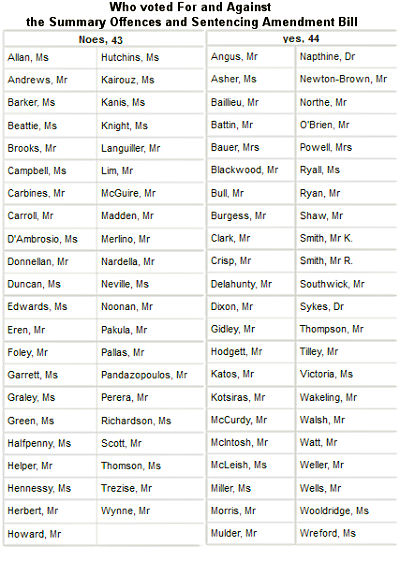
SUMMARY OFFENCES AND SENTENCING AMENDMENT BILL 2013
- Second reading
Debate resumed from 12 December 2013; motion of Mr CLARK (Attorney-General).
Mr PAKULA (Lyndhurst) -- It gives me no pleasure to rise to speak on the
Summary Offences and Sentencing Amendment Bill 2013. However, it gives me some
pleasure to indicate to the house that Labor will oppose the bill, and it will
oppose it proudly. We will oppose this bill because it amounts to the potential
criminalisation of all forms of protest in the state of Victoria. This is a bill
which represents the Premier's impersonation of Joh Bjelke-Petersen, and which
represents his attempts to be a poor man's Campbell Newman.
This is a draconian, antidemocratic and unnecessary bill.
In an even more cynical, tricky and unworthy move, the government has tried to
combine its draconian move-on powers with its alcohol-exclusion orders
provisions. I say very clearly that we think the alcohol-exclusion orders are
unenforceable and unworkable. They are not sufficiently offensive for us to
oppose them, but we think the bill ought to be split. We are calling on the
government to split the bill. The two effects have absolutely no commonality
between them whatsoever. If the bill is split, we will vote for the
alcohol-exclusion provisions, which are part 3 of the bill, but if the
government does not agree to split the bill, it is our intention to move a
motion to do just that.
Mr O'Brien interjected.
Mr PAKULA -- The Treasurer interjects. We will come to the subject of how
tough this is on alcohol-fuelled violence during the course of the debate.
It is important to look at the detail of the move-on powers. Which circumstances
will give rise to police and protective services officers (PSOs) having the
power to move protesters on under the threat of arrest? All a police officer or
a PSO needs in order to move someone on is to suspect on reasonable grounds that
the person: has committed an offence in that place, is causing a reasonable
apprehension of violence to another person, is causing or is likely to cause an
unreasonable obstruction to others, is present for the purpose of procuring or
supplying drugs, or is impeding or attempting to impede any person from lawfully
entering or leaving premises or parts of premises.
We heard from the Attorney-General as reported in the Melbourne Leader on 17
February. The Attorney-General is reported to have said that the laws target
serial law-breakers. The Attorney-General is quoted as saying:
- Every Victorian has the right to protest and express their views.
- However, when individuals resort to unlawful tactics that threaten the
livelihood of law-abiding businesses (and) employees ... they must be held to
account.
That is what the Attorney-General said. But let us be clear: this is not a law
that applies solely to violent or unlawful protests -- it applies to any
protest. All that any police officer or PSO needs in order to break up a
protest, to move someone on or to arrest someone is a reasonable suspicion that
the person is causing an unreasonable obstruction, is likely to do so, or is
impeding or attempting to impede someone.
Mr O'Brien interjected.
Mr PAKULA -- The Treasurer interjects incessantly with his mantra, as if this
is some sort of brilliant -- --
The ACTING SPEAKER (Mr McCurdy) -- Order! It is disorderly to respond to
interjections.
Mr PAKULA -- I say to the Treasurer that this is the same old nonsense that
the Tories have been going on with for 100 years, and it is the same old
nonsense that they resort to when they are in strife. This is the
Page 480
same line that former Leader of the Opposition Robert Doyle ran in 2002 when he
was trying to save the furniture.
Let us go to examples of what would be covered by these move-on laws. They
include the lock-the-gate protest and the anti-fracking protest, which was
supported by The Nationals and the member for Bass. Those protesters could
easily be moved on or arrested under the powers provided in this bill. The
anti-McDonald's protesters in Tecoma could easily be moved on or arrested under
these powers.
Mr O'Brien interjected.
Mr PAKULA -- The Treasurer says, 'They should be moved on'. That is right,
because anyone's protest is illegitimate in his view. If the government believes
a picket is illegal, it will order the police to move the protesters on.
That is what the Treasurer is saying. The nurses who were protesting during
enterprise bargaining agreement negotiations when the member for Hawthorn was
Premier could be moved on under these powers. The Baiada picket, where workers
were being horribly exploited, could be moved on under these powers. Taxi
licence holders protesting on the steps of Parliament could be moved on under
these powers.
Teachers and even lawyers standing outside the County Court protesting against
legal aid cuts could be moved on under these powers. Paramedics could be moved
on under these powers. Anyone holding a protest outside a member of Parliament's
office could be moved on under these powers. Protesters holding a protest
outside 104 Exhibition Street could be moved on under these powers. On 28 June
2006 there was a protest in Liebig Street, Warrnambool, outside the office of
the member for South-West Coast and the now Premier came out. I refer to an
article in the Warrnambool Standard of June 2006, which says:
Dr Napthine's speech to workers was drowned out by crowd members shouting
'Out, out, out' as he said that since the federal government had been elected
in 1996 wages in real terms had increased ... Persistent heckling forced Dr
Napthine to retreat from the street into his office.
That is the kind of protest the government would like to see stopped and people
moved on or arrested because of some kind -- --
Mr O'Brien -- Garbage!
Mr PAKULA -- The Treasurer says, 'Rubbish'.
Mr Wynne -- 'Garbage' he said.
Mr PAKULA -- He said, 'Garbage'.
My question to the Treasurer is: how would he know. Is he suggesting that once
this power is provided that the government can control which protests are moved
on and which are not?
Mr O'Brien -- Don't you trust the courts?
Mr PAKULA -- It has got nothing to do with the courts.
The ACTING SPEAKER (Mr McCurdy) -- Order! The member should address his
comments through the Chair.
Mr PAKULA -- The Treasurer says, 'Don't you trust the courts?'. All that needs
to happen is that a policeman or protective services officer (PSO) on the ground
at the time forms a view about the nature of the protest and moves them on.
Even during a protest like the Plug the Pipe protest, an issue so beloved by the
members for Benalla, Swan Hill and Seymour; they could all be told to move on,
then be arrested, then have their names kept in a register and then have orders
issued against them.
The Treasurer behaves as if it is only the opposition, only the Labor Party,
that has formed this view about the move-on powers. Let us have a look at some
of the groups who have written to me and written to the government who are
opposed to these powers. They include the St Kilda Legal Service, the Federation
of Community Legal Centres Victoria, the Peninsula Community Legal Centre,
Youthlaw, Western Suburbs Legal Service, the Independent Riders Group and the
Law Institute of Victoria. Geoff Bowyer, the new president of the law institute,
has said these laws could:
- ...
- have a significant and devastating impact on the homeless who, by the nature
of their situation, are forced to gather in public places, often returning to
a familiar spot after being moved on.
The Human Rights Law Centre has described the potential for misuse as being very
high. This is not something that has just been dreamt up by the Labor Party or
by unions; this is widely opposed throughout the legal fraternity by the Human
Rights Law Centre, the law institute, the Independent Riders Group and all
manner of members of this community because they are draconian laws and they are
unwise laws.
It is interesting to recall what government members said when they were in
opposition. On 9 December 2009 the member for Benalla talked about the
'democratic right to protest' of the Plug the Pipe protesters, but now he wants
to take that right away for
Page 481
others. I suppose it does not matter for the member for Benalla because he is on
his way out of here.
On 10 November 2009, the member for Malvern, now the Treasurer, said:
- It is important to note the fact that there is a very important right to
lawfully protest. We on this side of the house would not seek to do anything
which would interfere with that lawful right.
What happened to those noble sentiments?
Mr O'Brien interjected.
Mr PAKULA -- The Treasurer keeps saying, 'Lawful' as if it is only illegal
protests which are targeted, but that is not the case.
Mr O'Brien interjected.
Mr PAKULA -- Treasurer, unlike you, I have.
The ACTING SPEAKER (Mr McCurdy) -- Order! The member should address his
comments through the Chair.
Mr PAKULA -- On 15 March 2010 the Leader of The Nationals, now the Deputy
Premier, said:
- Any information gathered on protesters by the government or private security
firms must be destroyed.
And:
- There's something very wrong in Victoria when local communities are subject to
this sort of bullying and intimidation from a government.
Now he wants police to record and keep the very same information against
protesters.
We have already heard the Treasurer say today that those anti-McDonald's
protesters in Tecoma ought to have been moved on and ought to have been arrested
if they did not move on when they were told to. That is the way this government
wants to treat communities; that is the way this government wants to treat
protests in this state. Every Victorian should understand the way in which the
government is seeking to stifle protest in this state. Police and PSOs can give
a move-on order to a group; and if it is not complied with, every member of that
group can be arrested, their names recorded, their names retained and 12-month
exclusion orders applied for. Nothing unlawful needs to be happening.
Mr O'Brien interjected.
The ACTING SPEAKER (Mr McCurdy) -- Order! I ask the Treasurer to cease
interjecting.
Mr PAKULA -- Can I take up the interjection?
The ACTING SPEAKER (Mr McCurdy) -- Order! No.
Mr PAKULA -- Acting Speaker, let me make the point without the interjection.
The ACTING SPEAKER (Mr McCurdy) -- Order! The member for Lyndhurst should
address his comments through the Chair.
Mr PAKULA -- In the case of industrial picketing, Acting Speaker, this power
applies even to legally protected industrial action. That has been made clear by
the government. It applies to picket lines against which no orders have been
granted, and it applies to picket lines against which no orders have been
sought, so no-one needs to have gone to court, and no illegal declaration needs
to have been made about the picket line. When the Treasurer sits here and says
that it is only about illegal pickets, that is pure sophistry on his part. No
order has to have been made against the picket, and no order has to have been
applied for against the picket. The determination of whether or not it is
illegal is simply in the hands of whoever is on duty at the time.
Mr O'Brien interjected.
Mr PAKULA -- All that in fact needs to have happened, Treasurer, is that a big
Liberal Party donor needs to have made a call to your office or to the Premier's
office, after which you make the call and say, 'Get these people out of here',
as we know occurred before.
Mr O'Brien -- On a point of order, Acting Speaker, I find the comments of the
member for Lyndhurst offensive and require them to be withdrawn.
The ACTING SPEAKER (Mr McCurdy) -- Order! The member for Lyndhurst has been
asked to withdraw.
Mr PAKULA -- I will withdraw. I think it is extraordinary that the Treasurer
is so thin-skinned given the accusations and the allegations he throws around in
this house day in and day out.
The ACTING SPEAKER (Mr McCurdy) -- Order! The member for Lyndhurst will
address his remarks through the Chair.
An honourable member -- Withdraw.
Mr PAKULA -- I withdraw. Day in, day out this Treasurer -- --
Page 482
The ACTING SPEAKER (Mr McCurdy) -- Order! The member for Lyndhurst has
withdrawn. The member for Lyndhurst to continue.
Mr PAKULA -- Day in, day out this Treasurer comes into this place and makes
all sorts of unfounded allegations, not just against members of this Parliament
but against people who have no connection to this Parliament. He does it under
privilege, and he never repeats his allegations outside.
Mr O'Brien -- Struck a nerve, didn't I?
Mr PAKULA -- Well, can I say that I have never asked him for a withdrawal. The
fact is that all that needs to happen is that police need to reasonably suspect
that someone has been impeded or -- --
Honourable members interjecting.
The ACTING SPEAKER (Mr McCurdy) -- Order! I ask the member for Monbulk and the
Treasurer to cease interjecting.
Mr PAKULA -- All that needs to happen for this law to be activated is for
someone on the ground, a police officer or a protective services officer, to
reasonably suspect that someone is or may be impeded or obstructed, or that
someone might attempt to impede or obstruct. It applies to every example I have
cited. In regard to the courts, the courts only get involved after the moving on
has happened.
The government picks a bunch of examples and says, 'That would not happen in
reality'. But as I have indicated, once the power is granted, unless the
government knows something that the opposition does not, the government does not
get to pick and choose which forms of protest and which types of protesters get
moved on.
Every community rally and every community protest can be subject to these laws,
unless there is a phone call.
We heard interjections from the Treasurer. The government wants Victorians to
believe that this bill is about drug dealing. Why then is it not confined to
that? The government wants Victorians to believe that the bill is about violent
or unlawful protest, but the fact is the police already have the power to deal
with unlawful behaviour, violence or trespass. The government wants Victorians
to believe that this is about things like
east-west link protesters, but by the Linking Melbourne Authority's own
admission those protests have not cost the project even one day of lost time.
This is about all the other protests -- the lawful ones, the peaceful ones, the
inconvenient ones -- --
Mr O'Brien interjected.
Mr PAKULA -- Do you have Tourette's? You just go on and on and on with the
same mantra.
The ACTING SPEAKER (Mr McCurdy) -- Order! The member for Lyndhurst!
Mr PAKULA -- This is about the protests that cause the government political
embarrassment. This is about the ones where the government's mates make a phone
call and say, 'Call off the dogs'. This is about a government wanting to pick
and choose which protests it sees as worthy and which it sees as inconvenient,
where these powers will be activated. It is unwarranted, unnecessary,
antidemocratic and draconian, and it runs counter to every faux noble sentiment
coalition MPs expressed in opposition.
Those sentiments were convenient to them then, but we know, by virtue of the
introduction of this bill, that they did not mean them. If you applied all of
those quotes that I referred to earlier to this law, you would see there is an
inexplicable degree of dissonance. If you took the comments of the Treasurer,
the Deputy Premier and the member for Benalla at face value, you would think
those people could not support the introduction of this bill.
Turning to the alcohol-exclusion orders, they are a meritorious idea. The
opposition says quite openly that they are a meritorious idea. The notion of
barring people from drinking alcohol if they have committed heinous crimes in
which alcohol is a significant factor is a meritorious idea. But it is a good
idea which is being incompetently executed. It is an idea the utility of which
has been almost fatally undermined by the government's brainless obsession with
looking tough.
If you look at the provisions of the bill, it will not achieve, on any planet,
the objectives that the government says are the objectives of the bill.
Does the government, for example, leave it to judges to assess the merits of a
particular case and to look at how serious the offence was? Does the government
leave it to judges to assess whether the offender has priors? Does the
government leave it to judges to assess how big a factor alcohol was in the
commission of the offence and then leave it to judges to decide how long to
exclude the offender from licenced places for? No. It is a mandated period of
two years even if in the circumstances a judge might find that the appropriate
exclusion period was one year or indeed three years. The judge does not get to
make any of those decisions. The government has said that in every case it is
two years. Whether or not two years is right or justifiable, no matter how big a
factor alcohol was, no matter what
Page 483
priors the offender has, it is two years, two years, two years.
Does the government provide licensed venues with any kind of information about
who the excluded people are? Does the government provide licensed venues with a
list of names of people who have been excluded? Does the government provide
licensed venues with photographs of people who have been excluded? Does the
government provide any additional resources whatsoever to enforce these
alcohol-exclusion orders? The answers are no, no, no and no. No-one who runs any
licensed venue will have any idea, either by name or picture, of who the
excluded people are. There are no additional resources for anyone to enforce
this law. It is totally and utterly unenforceable.
Most importantly, I ask: is it the drinking of alcohol that is barred? Is it the
purchase of alcohol that is barred? The answer is no.
Mr Clark interjected.
Mr PAKULA -- I say to the Attorney-General that that would clearly make too
much sense for this government. If someone who is excluded wanders across the
road to the European and orders a coffee or a poached egg, they will have
committed an offence -- because it is a licensed venue. Someone else can buy
that person a sixpack of beer and that is fine, but if they go across the road
and order a coffee at a licensed venue, they will have committed an offence. The
Treasurer was saying by interjection before that the Labor Party does not want
to deal with alcohol-fuelled violence. I ask: are the streets really safer if a
violent drunk cannot purchase an egg or if a violent drunk cannot order a coffee
at 8 o'clock in the morning? Are the streets really safer in those
circumstances?
Honourable members interjecting.
Mr PAKULA -- Every licensed venue, morning or night, whether or not the
offender -- --
Honourable members interjecting.
Mr PAKULA -- The Attorney-General is soft on boiled eggs. Seriously, it is
just a mantra repeated over and over again in the face of all the evidence. In
the face of a rising crime rate, in the face of overflowing prisons, in the face
of a court system collapsing and, in the face of legal aid falling apart,
members of this government keep running around beating their chests, saying, 'We
are tough on crime', while the crime rate goes up. What an absolute triumph! No
licensee of any venue, morning or night, whether or not the offender is trying
to buy alcohol, will have any information provided. There are no extra resources
for Victoria Police. This is just the epitome of an all-show, no-go confidence
trick. It is an absolute sham.
As I indicated at the outset, there is nothing in the provisions relating to the
alcohol-exclusion orders that could not be rectified, amended or fixed by a
government whose members applied some common sense and competence to them. If
the government is prepared to split the bill, opposition members will vote for
the alcohol-exclusion orders. If the government will not split the bill, in the
consideration-in-detail stage the opposition will move its own motion to do just
that. There is nothing in the alcohol-exclusion orders part of the bill that
cannot be fixed by a government whose members know what they are doing.
However, the move-on powers are irredeemable. They are draconian. They are quite
simply Bjelke-Petersen-era laws. They mean that we have set off down the
slippery slope.
Mr O'Brien interjected.
Mr PAKULA -- I say to the Treasurer that those people protesting outside
McDonald's in Tecoma are not thugs, nurses are not thugs, paramedics are not
thugs and taxi protesters out on the steps of Parliament are not thugs. I will
tell the house who government members believe is a thug. They believe that a
thug is anyone who opposes their agenda. Anyone who opposes this Treasurer's or
this Attorney-General's agenda is in their eyes a thug -- and they are
determined to shut those people up, to silence them and to haul them off to
jail. They want to haul off to jail taxi protesters, McDonald's Tecoma
protesters and Lock the Gate protesters. In the eyes of members of this
government these people are all thugs and enemies of the state because they have
the temerity to stand up to this government and to stand up for their rights.
Members on this side of the house want to make it very clear that we do not
believe that people protesting about a McDonald's in Tecoma are thugs, we do not
believe nurses are thugs, we do not believe teachers are thugs and we do not
believe paramedics are thugs. We do not believe that people who are standing up
for their basic rights and exercising their lawful right to protest are thugs.
With these laws, we have set off down the slippery slope. Today members are
debating a set of laws which infringe the vital right to protest that exists in
a democracy. It is a hard-fought-for right, a vital right and the hallmark of
any free society. These laws fundamentally offend the principles that all the
so-called lovers of freedom opposite claim to hold so dear. Members of the
Liberal Party believe in freedom
Page 484
for their mates, but they do not believe in freedom for the people who might
have the audacity to stand up for themselves and oppose the government's agenda.
The Labor Party will defend the right of people to protest, because these laws
do not only deal with unlawful and violent protest. These laws criminalise
lawful protest, they criminalise peaceful protest and they criminalise any
protest the government finds offensive. We will oppose these move-on laws, we
will oppose them proudly and, if we are elected in November, we will repeal
them.
Mr SOUTHWICK (Caulfield) -- It is my pleasure to rise to support the Summary
Offences and Sentencing Amendment Bill 2013. What a load of rubbish we have just
heard from the member for Lyndhurst -- talk about Chicken Little saying, 'The
sky is falling in' -- about what we are doing to keep people safe and ensure
that businesses can get on with what they need to do, which is provide jobs.
We have seen day in and day out in this place that the Labor Party is very quick
to stand up and talk about what is happening with jobs in our state. Yet time
and again outside various business premises in our state we have seen the rights
of those businesses being impeded by protesters who are not protesting lawfully
and are not peaceful. I will come to that in a minute.
The bill protects people's right to express their views and interests in a
legitimate way and continue to protest; however, it extends powers to deal with
people who are impeding others from lawfully accessing a premises, who have
committed an offence in a public place, who are causing others to have a
reasonable fear of violence or who are endangering safety or engaging in
behaviour that is likely to cause damage to other people's property.
Mr Pakula interjected.
The ACTING SPEAKER (Mr McCurdy) -- Order! The member for Lyndhurst has had his
chance.
Mr SOUTHWICK -- This is not about those people who want to peacefully protest
and express their views. This is about the unlawful thugs who support the Labor
Party. It is about the union mates who support and fund the Labor Party. The
Construction, Forestry, Mining and Energy Union has been out there engaging in
unlawful behaviour on building sites and has actively sought to disrupt business
and ensure that business comes to a standstill while union protesters are there.
We saw that with the Grocon action, which led to losses of $500 000 a day -- a
total of $10 million worth of damages -- due to inactivity as a result of the
union blockade that brought the streets to a standstill.
We saw it with the east-west link protests, which the member for Lyndhurst says
did not cost taxpayers a dollar.
Let me draw to the attention of the member for Lyndhurst the fact that the
police response to try to keep people safe covered 2575 8-hour shifts and is now
estimated to have exceeded $1.65 million in taxpayer money. Police have
pinpointed 10 people who broke the law in their efforts to prevent construction
of the east-west link from taking place. This is not about a peaceful protest.
It is about demonstrators stopping an economic activity that provides jobs and
ensures that Victoria remains open for business.
The Labor Party wants to shut the door and say, 'No, we're going to look after
our union mates'. I refer to Baiada Poultry in Laverton, which lost over $1
million in spoilt chicken as a result of protesters. They locked the doors
during that protest. A small business owner who had two trucks inside the
facility was not able to access the facility to get his spoilt chicken, and he
lost his small business as a result of being locked out of that plant.
Electricity was shut down and no diesel was allowed into that plant, and as a
result of the protest that small business and many other small businesses lost
work.
I now turn my attention to the boycott, divestment and sanctions (BDS) campaign
protests. We have seen a series of BDS protests. Opposition members are shaking
their heads, and so they should be. Firstly, in December 2010 we saw a protest
in Melbourne Central shopping centre. The protesters had agreed with police that
they would peacefully protest -- this comes to the crux of what this law change
is all about -- but they then went into Melbourne Central, completely took over
the shopping centre and protested until activists had to be removed from that
site. In the second incident protesters went to the Park Hyatt Melbourne hotel
and continued that behaviour.
Mr Pakula interjected.
Mr SOUTHWICK -- I will come to that.
The ACTING SPEAKER (Mr McCurdy) -- Order! The member for Caulfield should
speak through the Chair.
Mr SOUTHWICK -- In February 2011 there was another protest where police again
had to physically remove protesters who were impeding business at a store. It
shut down the whole shopping centre precinct for a number of hours. A number of
small businesses were affected as a result of this.
Page 485
In April 2011 a Jericho cosmetics store, a small business, closed because of two
previous protests. The business owners decided to close the store because they
were not going to deal with protesters again. That was not good enough for the
protesters; they wanted to get someone, so they went to the Max Brenner store.
The Max Brenner protest involved physical confrontation with police members, and
the demonstrators were moved on. There were altercations with police, and 10
police members sustained minor injuries as a result of the protest -- so much
for the claims of a peaceful protest from the Labor Party.
In the fourth protest, again in 2011, the police public order management unit
was brought in to help police at the event with the intention of making arrests.
At this stage no arrests were made. The protesters could not get close to the
store because they were surrounded by police trying to protect the shop owners
and the businesses, so the protesters decided to take up positions on the ground
and first levels of the shopping centre.
On this occasion Melbourne Central was again stampeded by these protesters and
shut down for a number of hours. Not one store, not two stores, but the whole of
Melbourne Central was shut down as a result of this.
A fifth protest took place at a subsequent time. Some protesters went into the
Max Brenner store while others waited in another wing. The protesters who went
into the store had jumpers on and appeared to be consumers. At a given time they
took off their jumpers and were wearing shirts with protest slogans. They
chained themselves to the chairs and tables in the store and the protesters in
the other wing came into the store. An altercation took place and 19 arrests
were made.
Honourable members interjecting.
Mr SOUTHWICK -- Here is the kicker for the vocalists on the other side: all
the 19 protesters arrested were let off under the current laws because in those
circumstances they were not breaking the law. They could chain themselves to
furniture in the store, shut it down for hours, block traffic and block people
from coming into the store, but they were all let off because the current law
does not provide for move-on powers. The current law does not provide for those
who shut down businesses and aggressively protest, but the Labor Party is happy
for these protesters to continue aggressively doing what they are doing --
shutting down businesses one after the other and targeting businesses in
Victoria.
Honourable members interjecting.
The ACTING SPEAKER (Mr McCurdy) -- Order! The member for Yuroke!
Mr SOUTHWICK -- If opposition members were genuine, they would distinguish
between what are genuine, peaceful protests and what is a disgraceful attempt to
shut down and disrupt a business and harm not only that business but its
employees, the shopkeeper, shoppers and everybody else around the store.
This legislation is designed to restore activity, restore confidence and give
police necessary powers. Opposition members should be standing up for the
Victorian policemen and women who have to deal with these disgraceful
activities. They should be standing up for those Victorian police who have to
cop it on the chin time and again. The police have told us there is nothing they
can do under the current laws. Under these new laws we are giving them the
opportunity to do something about it -- arrest those behaving disruptively, stop
that sort of activity and allow businesses to get on with what they do best. The
bill is designed to allow businesses to be successful, not be shut down, and to
provide jobs, not cut jobs, as the Labor Party wants to do.
Mr MERLINO (Monbulk) -- The Labor Party vehemently opposes the Summary
Offences and Sentencing Amendment Bill 2013. I oppose this bill on behalf of the
community I am proud to represent. Labor opposes this bill because it is grossly
antidemocratic. The bill seeks to criminalise all forms of peaceful community
protest. The single biggest issue in the Dandenongs is the establishment of a
McDonald's franchise in Tecoma. As many members would be aware, it is the
subject of a massive and peaceful community protest.
On Tuesday members of my community -- local mums and dads -- protested on the
steps of Parliament House against McDonald's in Tecoma. During debate on this
bill, as the shadow Attorney-General, the member for Lyndhurst, was on his feet
leading Labor's opposition to the bill, the Treasurer said the McDonald's
protesters should have been moved on. That is the truth of what is behind this
legislation. I tell the Treasurer that every single person in Tecoma and right
across the Dandenongs will be made aware of his comments.
Mr O'Brien interjected.
Mr MERLINO -- 'Terrific', the Treasurer says. He can rest assured that that
will happen.
Page 486
Eleven hundred and seventy submissions opposed the application to council, and
they did so because this McDonald's would be completely and utterly out of
character with the Dandenongs and would set a disastrous precedent. Council
unanimously opposed the application. The Victorian Civil and Administrative
Tribunal (VCAT), in a reprehensible decision, overturned that democratic
decision of council. The Napthine government has done nothing to resolve this
issue. Indeed in this bill the government seeks to blame and curtail the rights
of the Dandenong Ranges community.
The failure of VCAT and this government has not deterred the community. There
have been public rallies of thousands and thousands of people, almost daily
protests and a petition of well over 100 000 signatures. A survey was conducted
and every house in Tecoma was doorknocked with one question: 'Are you for or
against the proposed McDonald's in Tecoma?'. Almost 90 per cent opposed it.
The people of Tecoma and the Dandenong Ranges do not want it, and in our
democratic society they have every right to have their voices heard and to
protest peacefully against this inappropriate development. They have been a
constant presence at the construction site -- and good on them, I say.
On 16 July last year McDonald's issued a writ against eight protesters who
became known as the Tecoma 8. On 18 July McDonald's obtained an interim
injunction in the Supreme Court that included not only the original eight
protesters but anyone else who had obstructed a vehicle or trespassed in the
previous two weeks. 'Anyone else' -- does this sound familiar? On 28 July, 3000
to 4000 people turned out to protest on the streets of Tecoma -- local
residents, mums and dads, who do not want this facility built.
The law firm Maurice Blackburn took up the case. It stated:
- Maurice Blackburn represented the 'Tecoma 8' pro bono because we believe
peaceful protest is fundamental to civil rights and democracy.
- ...
- We believe the legal action and tactics being used by McDonald's Australia to
stop protesters in Tecoma, Victoria, were an affront to civil liberties.
- An interim Supreme Court injunction restricted the movement of people who had
protested against the development. The final orders sought by McDonald's
involved a group being appointed as representatives of a much larger group. If
made, they were likely to be so broad in their application that they could
have applied to people who did not know they were subject to them ...
- This case went beyond Tecoma.
- The orders were intimidating for many community activists because they bound
an ill-defined class of people, and were structured in such a way that, if
successful, could have had significant implications for other community
protests.
Following mediation McDonald's abandoned the lawsuit. The Napthine government,
through this draconian and antidemocratic bill, is seeking to do what McDonald's
failed to do. The Napthine government is acting against the community of the
Dandenong Ranges, and this bill is an affront to those people. It provides
powers to police to move on one person or many, to break up community protests
and to arrest protesters if they have a reasonable suspicion that someone is
impeding or attempting to impede. Deputy Speaker, when you have 4000 people
marching down Burwood Highway, it is a bit hard, don't you think, not to be
impeding?
If the police choose to move people on, as the Attorney-General said in his
second-reading speech:
- ... police and PSOs may give one direction to an entire group rather than
having individually to direct each person in the group to move on.
If those 4000 local residents marching down Burwood Highway are told by police
to move on and they choose not to, they could be arrested. They will be ordered
to give their names and addresses. Those names and addresses could be retained,
and then the police could apply for an exclusion order -- an exclusion order for
4000 local residents -- to say that they cannot congregate around Tecoma to
express their concern about the McDonald's.
Through this bill this government is criminalising the peaceful community
protest of thousands of my constituents. Labor will never support this.
Through this bill the government wants to destroy the local campaign to stop
McDonald's in Tecoma. Just a few minutes ago the Treasurer exposed the truth of
that. He wants the protesters to be moved on, he wants the police to -- --
The DEPUTY SPEAKER -- Order! The member knows it is disorderly to respond to
interjections, and I would suggest that he does not respond to the interjection
from the Treasurer.
Mr Pakula -- The Treasurer is not even here!
The DEPUTY SPEAKER -- Order! I am the Chair here. I have said it is disorderly
to respond to interjections. It does not matter when the interjection was, it is
disorderly to respond to it.
Page 487
Mr MERLINO -- I refer to comments from Maurice Blackburn, which acted pro bono
on behalf of the Tecoma 8. Maurice Blackburn lawyer Elizabeth O'Shea said this
about the bill:
- It effectively criminalises a range of behaviours that are fundamental to
freedom of assembly and freedom of speech. The right to protest has resulted
in hard-won freedoms we all enjoy and curbed excesses of corporate and
political power. Why is the Victorian government so frightened of people
congregating to express their views?
Why is the Napthine government so afraid of my community in the Dandenong
Ranges? Labor is opposing this bill and, as the shadow Attorney-General pointed
out, if we are elected to government in November, Labor will repeal the
legislation.
I challenge the future Liberal candidate for Monbulk to make that same
commitment in the lead-up to this election. I will be putting that to the future
Liberal candidate for Monbulk, everyone in Tecoma will be putting that to the
future Liberal candidate for Monbulk, and we will find out if that candidate has
the same view as the Treasurer, the Premier, the Attorney-General and everyone
on the government benches who feels that it is appropriate to produce a piece of
legislation that is so antidemocratic, so like what Joh Bjelke-Petersen would
have produced in Queensland many years ago. That is what this government has
produced. Labor will oppose the bill, and Labor will repeal the legislation if
elected in November.
Mr NEWTON-BROWN (Prahran) -- The Summary Offences and Sentencing Amendment
Bill 2013 is yet another election commitment being fulfilled by the coalition
government.
We promised we would set up banning notices for people convicted of violent
assaults in licensed premises and give police and licensees the tools they need
to make sure that they are safe when people socialise on licensed premises. This
is what we are doing with this bill, but it also goes much further. As we heard
during the harangue by the member for Monbulk over the last 10 minutes, the bill
also gives police the power to move people on.
Much misinformation has been spread, both in the chamber today by the members
for Monbulk and Lyndhurst and more generally by the union movement. There has
been a lot of froth and bubble about rights being protected and the freedom of
people to demonstrate and protest. This bill does nothing to impinge on those
rights. Peaceful demonstration is a cherished part of our democracy, and it is
not impacted by this bill. The right to protest or demonstrate is not absolute.
The members for Lyndhurst and Monbulk seem to think that those rights should not
be tempered in any way.
The new human rights commissioner, Tim Wilson, took up his post this week. He is
one of my constituents. In one of his first interviews he said that freedoms are
not absolute; they must be tempered by the impacts they have on other freedoms.
In other words, freedom cannot impinge on other rights which are as legitimate.
Therefore it is okay to exercise your right to demonstrate as long as that right
to demonstrate does not impinge on other people's rights not to be intimidated,
threatened, harassed or attacked. It is not okay to demonstrate if that involves
forcibly preventing people from entering their workplace. It is not okay to
demonstrate if that involves punching police horses or running over people in
vehicles.
Are these the freedoms that the member for Monbulk is seeking to protect?
Because every one of those things happened at a demonstration at the Myer
Emporium site in 2012. I went for a walk down there when the picket line was in
force, and I have to say it was an intimidating sight.
Large numbers of workers were blocking the entrance to the building site, there
was a lot of yelling and screaming, and the Grollos sustained an attack on them
which went on for weeks. The police had inadequate powers to move on the violent
protesters.
As an aside and by way of disclosure, I worked for the Grollos for three months
as a labourer on one of their building sites. I was an undercover lawyer. I was
working in construction law, and I was sent to learn about construction hands
on, so I worked at the State Electricity Commission headquarters site in
Flinders Lane. It was quite an experience. I went through various trades --
concreting, steel fixing, installing conduits -- but my cover was blown early
on, perhaps by the neat creases my mother had ironed in my overalls. Despite
this, the workforce was happy to have me there and I learnt a lot.
There was a little bit of gentle bastardisation -- I was given a homemade hammer
made out of a bit of water pipe, which was balanced like a sledgehammer -- but I
was happy to endure that and was certainly happy to be out in the open air,
learning a bit about the practicalities of the area of law in which I was
working.
One thing that struck me, however, was the loyalty of the Grollo workforce. It
was like one big family. Workers were looked after, and those with special needs
were looked after. It was not about fighting for awards and conflict between
boss and worker; it really was an atmosphere of respect and mutual care that
permeated that workforce. So it did not surprise me to
Page 488
hear that the Grollo workforce united against those union picketers. People were
drawn in from outside that site to protest, and the Grollo workforce, many of
whom were union members, actually asked the picketers to go away. All they
wanted to do was to turn up to work for their employer and do the job for which
they were being paid.
I refer briefly to an article by Daniel Grollo which was published in the
Financial Review this week. He set out the sequence of events that led to this
picketing, which he said started 12 years ago when the Grollos took a stand
against lawless behaviour by unions. The Construction, Forestry, Mining and
Energy Union (CFMEU) secretary at the time simply said, 'We'll just smash them',
and that is what they tried to do. Mr Grollo noted that many of his
subcontractors and suppliers could not stand the heat, could not stand the
weight of the campaign against them, and he is thankful that there will soon be
a royal commission to put the construction industry under the microscope.
Mr Grollo shed light on the CFMEU 'business model', stating that the standard
practice is for the CFMEU to demand that a construction company employ a union
colleague that it nominates. Once that occurs, if the company caves in and
agrees, the union then has a foothold to take control of the operations and shut
down the site industrially, should there be any challenge to the union's power
in the future.
August 2012 was when the CFMEU marshalled those thousands of workers from other
building sites. It made the claim that Grocon was anti-union and had shocking
safety standards when in fact the federal safety watchdog had just recognised
Grocon as having the best safety systems across the whole industry. Certainly
the employees of Grocon did not support the union's claims on safety. They were
spurious claims with a spurious basis on which the violent picket line was
established.
The Grocon workers themselves went public, put their necks on the line and wrote
an open letter, simply asking that the basic rights that the union leadership
enjoyed also be extended to the workers on the Grocon site -- that is, to be
able to go to work, to have the respect of the union, of the workers and of the
company, and for business to continue without these sorts of illegal
disruptions.
Therefore the question has to be asked: is this what the ALP is seeking to
protect? Is it seeking to protect the rights of people to demonstrate in a way
which is illegal and which is against the interests of those workers who wish to
enter their workplace in a legal manner? It is clear that there are numerous
other examples as well. The Max Brenner case is another high-profile example of
an inappropriate demonstration, with the boycott divestment and sanctions (BDS)
organisation protesting outside the Max Brenner stores.
Again, this was a disgusting and in this case also a racist campaign that simply
overstepped the mark and had a terrible impact on the business of Max Brenner.
It scared customers away. Is this really the freedom the ALP wishes to protect
-- freedom for the BDS organisation to protest against businesses such as Max
Brenner?
The coalition government is prepared to stand up for the Jewish community -- for
the whole community -- when it is attacked by unlawful picket lines and unlawful
demonstrations that overstep the mark, from free speech to impacting on those
other rights we also hold dear.
With this legislation a clear message is being sent: peaceful protest and
peaceful demonstration is encouraged -- it is part of our democracy -- but the
community does not think it is okay to stop people going to work through fear
and intimidation, the community does not think it is okay to violently attack
police who are trying to uphold people's rights to go to work and the community
does not accept that protest can be used for ugly, racist attacks on decent,
law-abiding people. The bill should be supported by the opposition, and I
commend it to the house.
Mr WYNNE (Richmond) -- I rise to make a contribution to the Summary Offences
and Sentencing Amendment Bill 2013 following the superb contributions by the
shadow Attorney-General and the Deputy Leader of the Opposition.
In doing so I reiterate the fundamental position of the Australian Labor Party
that not only do we oppose this bill but that if we are given the honour of
being elected at the end of this year, we will repeal this bill as one of our
first actions in government.
Why do we make this commitment? We do it for some very fundamental reasons. This
bill essentially erodes the hard-fought-for rights of people to protest in this
state. Its genesis is a deep, abiding and visceral hatred by this government of
people who seek to show dissent, people who seek to organise themselves, people
who are part of organised labour, people who are part of the trade union
movement. We see this demonstrated every day by this unelected Premier when he
comes in here at question time. There is nothing that excites this Premier more
than bashing the Labor Party and the trade union movement. These are the only
two things in life that give him pleasure. It is the same old shtick by this
government.
All this morally bankrupt government can do is bring forward this sort of
legislation that essentially erodes the fundamental rights of citizens in our
community to
Page 489
stand up and protest when they see decisions proposed by this government that
are wrong. It is wrong in relation to the east-west tunnel, which is a
fundamental mistake that has been made by this government. I support the right
of members of my community to protest peacefully against the east-west tunnel
every single day. I support the people of the community of Tecoma if they want
to stand up and express their views about decisions made and about how their
community ought to operate in the future. I also support the right of members of
the trade union movement to peacefully protest to ensure their fundamental
rights are protected. That is why we oppose this legislation. It is draconian
and antidemocratic, and it echoes back to those very dark days of the
Bjelke-Petersen government. Who could ever forget those days when, if more than
two people -- three people -- congregated together it was an illegal act. We see
the views of this deeply conservative Attorney-General echoing through this
legislation. That is very clear to us.
There are a number of aspects to this bill that I think are extraordinarily
dangerous. The first is that in the context of this bill a police officer or a
protective services officer (PSO) merely needs to suspect on reasonable grounds
that a person has committed an offence in that place or is causing a reasonable
apprehension of violence in another person, is causing or is likely to cause an
undue obstruction to others or is present for the purposes of procuring or
supplying drugs. The bill refers to reasonable grounds. I was very concerned
after having recently read a really excellent brief provided to, I think, all
members of Parliament by the Fitzroy Legal Service.
It provided a brief to us to inform the community of the potential impacts of
this bill.
The briefing paper was provided by Meghan Fitzgerald, the solicitor for the
Fitzroy Legal Service, and is endorsed by no less prestigious organisations than
the Salvation Army; the Council to Homeless Persons; the Victorian Drug and
Alcohol Association; HomeGround Services, one of our major and distinguished
emergency housing providers; Youth Projects; Justice Connect: Homeless Law; Flat
Out; the Victorian Aboriginal Legal Service; and others. These are prestigious
organisations, particularly the Salvation Army. They have noted that very deep
concerns have been expressed about the potential impact of this particular bill
on the most marginalised communities.
It is not surprising that I would deal with this issue, given that I have a long
history of working with and supporting marginalised communities, not only in my
own electorate but more generally across the state. What strikes me particularly
about this bill is the aspect of it that goes to the question of someone causing
or being likely to cause an undue obstruction to others.
I will tell the house the story of where I was on Sunday. I went down to
Enterprize Park to represent my party and to acknowledge the tragic death of a
homeless man called Mouse, who had been stabbed to death in the viaduct
underneath the railway line at the park.
I went to that event with members of the Salvation Army and with the Lord Mayor
and other distinguished people. I was simply there to acknowledge the fact that
not only had dreadful harm being done there but to say more broadly to the
community that homeless people are welcome, that there is a place for homeless
people in this city and that this poor 42-year-old man's life had not been taken
in vain. I was there to say that we as a community were prepared -- and there
were perhaps 200 to 300 of us present -- to stand up together and say, 'No, your
life actually did amount to something, Mouse. We do acknowledge your life, and
in the future we need to do better when we are trying to deal with homeless
people in this state'.
Certainly the legacy of this government thus far is a very sad legacy when it
comes to addressing homelessness.
What does the bill mean for those displaced people? Causing unreasonable
obstruction is one of the tests for whether a PSO or police officer can move
somebody on. The people who are sleeping under that viaduct may well, in the
context of this bill, cause unreasonable obstruction. They may offend people
because they are living in the public realm. This is where they live. I invite
any member to go over to the substation in Fitzroy Gardens at the back of this
Parliament House at lunchtime today, because what they see might offend them.
There will be homeless people sleeping around that substation tonight. Members
may find that offensive and an unreasonable obstruction. Indeed Victoria Police
could find that an unreasonable obstruction as well and move those people on,
but move them on to where? They have nowhere to go, and that is why they are
sleeping in parks.
That is why people are sleeping in vulnerable conditions underneath the viaduct
at Enterprize Park.
The bill is completely unreasonable. It is unjustified that this piece of
legislation is before the Parliament. It will deleteriously impact upon the most
vulnerable people in our community. I refer not only to homeless people but also
to my friends in the Aboriginal community, who also live in the public realm
because that is how they choose to congregate. Smith Street is a major
connection point for members of Aboriginal communities moving through Melbourne
and seeking to link up with relatives and friends. There is absolutely the
potential that someone will create an unreasonable
Page 490
obstruction and the police will be able to move them on.
I submit that this piece of legislation is deeply rooted in the most
conservative elements of this government. It is a shameful piece of legislation.
It seeks to vilify and criminalise organised labour in this state, which is a
shameful thing. Indeed it has the real potential to inflict very severe harm on
the most marginalised in our community -- people who live their lives in the
public realm. Shame upon the government!
Dr SYKES (Benalla) -- I rise to contribute to the second-reading debate on the
Summary Offences and Sentencing Amendment Bill 2013. I wish to make it very
clear that I strongly endorse the bill. It is yet another plank in our
government bringing law and order to Victoria and delivering what most people
want -- that is, to be able to feel safe in our community and go to work safely.
We have heard the rhetoric from those on the other side. Crouching Tiger pounced
today. After a series of insipid performances, the member for Lyndhurst launched
into a tirade that was high on emotion, passion and rhetoric but out of touch
with what most Victorians want. As I said, most Victorians want to be free from
dangerous and threatening situations. They want to be able to walk the streets
and go to work without threats to their safety. They do not want taxpayers
dollars to be wasted on controlling violent protesters, and they do not want law
enforcement officers to be put at risk of injury as a result of the unruly and
at times absolutely disgraceful behaviour of some protesters.
The member for Caulfield drew on some examples, and I encourage people to read
his contribution in Hansard, because it is quite clear that a number of these
protests have been expensive to deal with and that serial offenders -- people
who continually break the law -- have been identified.
I think it was the member for Prahran who indicated that under the current laws
there are problems with bringing those people to justice. We saw the Leader of
the Opposition standing shoulder to shoulder with the Construction, Forestry,
Mining and Energy Union (CFMEU). At the same time, through the media and other
means, the outrageous, illegal behaviour of members of the CFMEU has been
exposed -- --
Honourable members interjecting.
The DEPUTY SPEAKER -- Order! We listened to the member for Monbulk, and now he
should listen to the member for Benalla.
Dr SYKES -- The people I represent have had a gutful of this sort of
behaviour. They strongly endorse the action being taken by the Liberal-Nationals
coalition government. I also reject the assertion -- --
Honourable members interjecting.
The DEPUTY SPEAKER -- Order! Interjections are part of debates, but the
language has to be appropriate for Parliament. The calling of names across the
chamber will not be tolerated.
Dr SYKES -- Thank you, Deputy Speaker, for that welcome protection. The member
for Lyndhurst's opening assertion that this legislation will potentially
criminalise all forms of protest in Victoria is outrageously out of touch with
the reality. I reiterate that people who protest peacefully will continue to
have that right -- that right will be protected.
On the subject of protesting, I note that previous members have referred to a
role I have played in protesting, in particular my role in the Plug the Pipe
protests.
We protested peacefully, and yet members of the then Labor government referred
to us as 'ugly, ugly people', 'quasi-terrorists' and a 'sorry bunch of people'.
Just to make it clear that that is not a figment of my imagination or a
reflection of the passing of years, my staff checked with the parliamentary
library this morning. The library came back with the following information to
validate the statement I just made:
- Peter Batchelor first referred to the pipeline protesters as ugly, ugly people
when they were brought into the gallery on 5 February 2008 ...
And:
Mr Holding referred to The Nationals as a 'sorry bunch of people' and that the
protesters had 'quasi-terrorist threats' on 21 November 2007 ...
That is documented. It is a fact that those on the other side, who at this stage
say they are going to stand up and purport to represent the people, made those
outrageous accusations against people protesting legally. Of course, as history
has shown, the Labor Party was thrown out of office. The former Labor Premier
resigned, as did the former member for Thomastown and the former member for
Lyndhurst. And of course our government plugged the pipe.
We can also refer to a more recent protest experience, where under the existing
legislation it would be fair to say that I and, I believe, some members of the
opposition may have felt unnerved when we were seeking to go from Parliament
House to the Windsor Hotel. Members of Parliament in the state of Victoria
Page 491
were seeking to cross from this building to the Windsor Hotel to participate in
a function being conducted by members of the Jewish fraternity. We had to
assemble in this place and walk across that street surrounded by a cordon of
police -- police on either side -- and three police horses leading the way. I
felt uncomfortable about that, and I observed protesters attempting to injure
those horses and in the process making MPs of this state feel threatened. This
legislation is about protecting the rights of the majority of Victorians and
enabling peaceful protest but saying that violence, threatening behaviour and
serial offending are things we have had enough of and that those involved should
move on.
Moving on to the alcohol-exclusion orders, this is again sensible legislation.
We have all heard of the consequences of alcohol-fuelled violence. Like many
others, I have personal knowledge of it.
One my footy teammates, Terry Keenan, was in a pub celebrating a football
victory in the Goulburn Valley and as a result of someone being affected by
alcohol he was king hit. He went down and as a result suffered severe brain
damage. Ultimately his life support was turned off. I should say that in that
case the person who allegedly threw the punch was not found guilty, but it is an
example of a situation where alcohol-fuelled violence resulted in tragic
consequences. I and many others miss our good mate TK.
This legislation is about toughening up on people who are perpetrators of
alcohol-fuelled violence. It will enable exclusion orders to ensure that these
sorts of things are limited. It is part of an overall package where we seek to
provide the legislative ability to toughen up on people. However, in cases of
alcohol-fuelled violence and protesting it is about producing a cultural change,
getting acceptance of that and as a community rejecting the idea that
alcohol-fuelled violence is okay.
It is about rejecting the idea that there is a need to get fully tanked and then
do things that are unacceptable. It is about rejecting non-peaceful protest.
I imagine many of us have travelled to other parts of the world where people do
not enjoy the democracy we have. They realise that what we have here is special
and needs to be protected. That is why we are putting in place legislation that
further addresses the issue of alcohol-fuelled violence but importantly also
protects the right of people to protest peacefully. It absolutely rejects the
ability of people to be violent and disgraceful and to put people at risk and
cost taxpayers money. It is totally unacceptable behaviour in our democracy.
Ms GARRETT (Brunswick) -- It is with great passion that I rise today to speak
on this draconian and disgraceful piece of legislation that has been put before
the house.
Having heard a passionate contribution from the member for Benalla about the
Plug the Pipe protest and the journey those people went on and having seen the
passion on the member for Seymour's face, as we stand here it is worth noting
how people feel when there is something that strikes at the heart of their
community -- when they are concerned that something is going to destroy or
impact negatively on their community. In such cases people come together,
organise and stand up for the rights of that community.
It is very similar to the Construction, Forestry, Mining and Energy Union, which
has to have a funeral plan offered to its members because so many people die on
building sites. That is why it gets so passionate about occupational health and
safety.
It is so relevant to members of the Maritime Union of Australia, which lost an
entire generation of people because they loaded asbestos off the wharfs, day in,
day out, and which stood with Bernie Banton when the James Hardie company tried
to get out of this country without paying for its obligations and when there
were thousands of people protesting in the streets about that issue. We on this
side of the house, and we hope those on the other side of the house, feel pretty
passionate about those issues. Clearly we feel that people have the right to
come together to organise and stand up for occupational health and safety and
stand up for just compensation when people are injured or die at the hands of
negligent corporations.
We in this place operate under a solemn covenant with the people of Victoria. We
are given a great privilege to make laws -- to debate laws and pass them. That
covenant means that we must stand here and protect the rights and freedoms of
the citizens of this state, particularly those who have a small voice.
This must be done especially when it is inconvenient, politically embarrassing
or hard for those who hold the reins of power, because to fail to do so is to
break the covenant the government makes with Victorians to look after their
rights and their freedoms.
To go back to the Plug the Pipe protests, these clearly caused the former
government a considerable amount of political pain. They were embarrassing,
difficult and hard to manage, but the former government did not introduce
legislation to take away the right of those people to protest. The former
government understood that people have the right to protest, particularly when
it is embarrassing and inconvenient to government.
This Parliament has a responsibility to ensure that the checks and balances that
remain in our democracy are upheld. Hard-fought freedoms and rights can be torn
Page 492
away in an instant, and that is what this legislation does. This legislation
gives police an extraordinary and unchecked power to move protesters on if they
suspect the protesters have committed an offence, if there is a reasonable
apprehension of violence, if a protester is likely to cause an unreasonable
obstruction to others or is impeding or attempting to impede any person from
lawfully entering or leaving premises or part of premises. These are huge,
sweeping, discretionary, unfettered powers that will apply to all protests.
- An honourable member interjected.
Ms GARRETT -- Read the legislation. In the checks and balances of our
democracy we do not allow this Parliament to have unfettered -- --
Mr Burgess interjected.
The DEPUTY SPEAKER -- Order! The member for Hastings will get his turn.
Ms GARRETT -- We have courts and tribunals which are independent from
government and which are there to ensure that the rights and freedoms of
citizens are protected and are not subject to the whims of the government of the
day. It is always tempting for any government to come in here and hack into
those rights and freedoms because it is politically inconvenient and
embarrassing for those rights and freedoms to be upheld. People who stand up and
say, 'We dislike decisions of this government' cause the government pain, so no
doubt it is always tempting for members on that side of the chamber to squash
that sort of dissent. But a test of true character for those who hold the reins
of power is that they do not give in to that temptation, that they understand
there is a broader matter of principle and a broader responsibility and that
they are custodians in this place of democracy, which as we know is a fragile
beast and can be trampled on and dismantled very quickly.
We have had some very passionate contributions. The Deputy Leader of the
Opposition spoke at great length and with great measure about what has happened
in his community regarding the proposed McDonald's in Tecoma. We have talked
about what has happened with nurses protesting and having thousands of people in
the street protesting about health issues. We have talked about paramedics and
the ambulance crisis that is crippling this state.
Time and again people have to take to the streets to have their point heard and
to ensure that the broader community understands these issues. We have had
protests by taxi licence holders and teachers, and we have had anti-fracking
protests in regional Victoria. These are all important, precious expressions of
our democratic rights, and they are vehicles by which people can achieve change
when things are wrong. Let us face it: no government has all the answers. No
government under our democratic system should be able to dictate everything.
This is a vibrant democracy with those checks and balances.
This gets back to this government's obsession with the union movement. We have a
fundamental right as citizens in this country to have freedom of association,
and there is a reason we have this right. It has been a hard-fought -- --
Honourable members interjecting.
The DEPUTY SPEAKER -- Order! If the members for Monbulk and Gembrook wish to
continue their conversation, they can take it outside the chamber.
Ms GARRETT -- It has been a hard-fought right, because for many centuries
those without bargaining power were exploited and treated appallingly. They came
together collectively to organise, to address the power imbalance and to demand
proper terms and conditions of employment. This is a noble, fundamental right.
It is a fundamental right for those workers who are given the benefit of that
collective action.
It is a fundamental tenet of our democratic system that we have checks and
balances, that the powerful members of our community do not always have the
final voice, and that people can stand together and say, 'This is unacceptable.
We demand outcomes that benefit the collective, the whole or more than just
those who hold the reins of power or the reins of money'. This is what is so
deeply disturbing about this legislation. It gives so much unfettered and
unchecked power to police to move people on, and not just move them on but to
take their names. They can be in a book for 12 months. Shut it down!
This is not said lightly by members on this side of the house, but this
legislation is similar to that introduced by a former Premier of Queensland, Joh
Bjelke-Petersen, whereby if two people were together, it was an unlawful
association. This is a very slippery slope that will impact dramatically on the
rights of all of our citizens. Those of us who have lived in Queensland or know
people there are aware of the dark days when civil liberties and rights -- --
Mr Pakula interjected.
The DEPUTY SPEAKER -- Order! The member for Lyndhurst should listen to the
member for Brunswick.
Page 493
Ms GARRETT -- We stand here proudly as a party united with our brothers and
sisters in the trade union movement. We stand here proudly with the citizens of
Victoria who want the right to be able to call on this government to change its
legislative agenda and to implement policies to protect their communities. We do
so with passion and pride. If we are elected in November, this legislation will
be repealed. We call on this government to reflect on its covenant with the
Victorian people. Once again we are here debating an absolute breach of that
covenant. Those opposite should hang their heads in shame.
Mr WATT (Burwood) -- I rise to speak on the Summary Offences and Sentencing
Amendment Bill 2013. I have sat here for the whole debate and listened to the
empty rhetoric from those on the other side. The member for Brunswick has been
the only one on the other side who has provided any real substance or has not
overinflated figures.
The member for Brunswick has quite clearly put it out there and she has exposed
why those on the opposite side are so opposed to this bill. I think I heard the
words 'union', 'CFMEU' and 'brothers and sisters' scattered throughout the
speech. It was all about the masters of those on the other side who are pulling
the strings, organising their preselections, deciding who comes into this place
and deciding what they will say. It is all about those on the other side who are
dancing to the tune of their masters, and that is why they are so opposed to
this bill.
Honourable members interjecting.
Debate interrupted.
[Parliamentary Source]
Ms D'AMBROSIO (Mill Park) -- I am not sure that I heard it all, but who on the
other side could go past the comments of the member for Burwood?
I will put it simply, because there are many on this side of the house who want
to contribute to this very important bill, the Summary Offences and Sentencing
Amendment Bill 2013. I will confine my comments to 5 minutes. This bill is
nothing more than a Trojan Horse ridden by the ghost of Joh Bjelke-Petersen. I
remember the times of Joh Bjelke-Petersen. I remember the flight of many
Queenslanders who got caught up in peaceful, legitimate protests on the streets
at a time when not even five people could congregate without breaking the law
because of the conservative bent of an illegitimate government in Queensland.
This bill stinks of that.
I remind the house of the legitimate protests of ordinary Victorians that have
occurred and will continue to occur, whether it is a single Victorian, such as
the one who has been sleeping on the steps of Parliament for weeks on end now,
or hundreds and thousands of Victorians who want to legitimately express a view
about whatever it is that is of concern to them -- government policy, opposition
policy or whatever it might be. They all have a right to protest and they should
not be exposed to the type of draconian legislation that we are now sadly
debating in this house. I am proud to be a member of an opposition that has
declared unequivocally that in the event of its winning the election in November
it will repeal this insidious legislation.
Let me remind the house of the kinds of protests that this bill will seek to
scuttle. Taxi licence holders protested peacefully late last year outside the
office of a member for Northern Metropolitan Region in the Council.
The member called the police on that peaceful protest of family members who,
under this government, were going to lose their livelihood and perhaps their
house. That is the attitude of this government. Is it any wonder that today we
are confronted by this bill and this insidious Trojan Horse, which will allow
this government to take action in relation to protests by ordinary Victorians?
Many Victorians do not have access to the ears of government through any means
other than their own voices and their own presence. They seek to collectively
take a stand for what they believe is right. Whether I agree with them or not,
whether the government agrees with them or not, everyone has the right to do
that. It may be taxi licence holders or it may be textile, clothing and footwear
workers who are losing their jobs marching down the street. It may be people
like my mother, who did that. It may be people disputing a pipeline. You only
have to ask the previous Minister for Water about how peaceful some of those
protests were. This bill will mute every single one of those protests.
That is what the government is attempting to do today. The objective of this
bill is to demonise organised voices that come together with a common belief to
exercise a democratic right in between elections.
This is what democracy is about. Those on the other side pretend that this is
somehow about letting ordinary people get on with the business of everyday life.
I will stand up to my death to protect and preserve the rights of people to
voice their opinions, whether I believe in those opinions or not. Many people in
the 1970s and 1980s, and even up until the 1990s, protested on the streets
against nuclear war and the build-up of nuclear weapons. Those were legitimate
voices, whether I agreed with them or not -- which I happened to do. That was
legitimate protest, and this bill cuts through and ignores all of those
activities.
I ask this government whose voices it wants to hear in between elections.
Does it want to just hear the voices at the business lunches it has, where
people can buy
Page 496
access and have their voices heard through lobbyists? If government members
think that is sufficient to ensure a viable, thriving democracy, then they have
sorely misunderstood their role in government and the importance and
pre-eminence of citizens -- of every Victorian, whether as a lone voice or as
part of a collective of 100 000 people -- to be able to exercise their rights
and protest against any decision at any time peacefully, legitimately and with
conviction.
Members of this government will rue the day they start applying this law to
people who have a legitimate concern and are under suspicion at the whim of an
authorised officer. They might be mothers who are crying over the deaths of
their sons because of ambulance delays, they might be taxi licence holders or
they might be workers at Golden Circle. This week 120 workers at Golden Circle
are on a picket line because this government is failing the manufacturing
industry.
This government has been happy to not say even one word in support of those
workers in Mill Park whose factory is closing down in March with the loss of 120
jobs to Queensland. Theirs is a legitimate protest because this government has
no plan to save jobs. These are the voices of people in my community for whom I
will advocate and support their right to express their protest to the death.
Members of this government should be ashamed of themselves.
Ms KANIS (Melbourne) -- The member for Ferntree Gully ranted at us for 10
minutes about unions and what we will and will not do. He has now left the
chamber, but let me clarify Labor's position on this bill. Labor will oppose the
bill. We oppose the bill because it amounts to criminalisation of all forms of
protest in this state. I emphasise the word 'all'. In our view the bill is
draconian, antidemocratic and unnecessary.
What is also awful about this bill is the fact that it is a cynical, tricky and
unworthy wedge device. The government has combined the move-on powers in the
bill with its alcohol-exclusion order provisions.
While we believe the alcohol-exclusion provisions are unworkable and
unenforceable, they are not offensive to us. We are calling on the government to
split the bill. If the bill is split, as the member for Lyndhurst outlined in
his contribution, we will vote for the alcohol-exclusion provisions that make up
part 3 of the bill. However, we defend the right of Victorians to protest. We
oppose the move-on powers contained in the bill, and if elected, we will repeal
them.
The member for Ferntree Gully in his contribution was waving papers around and
yelling at us, but he did not
Page 498
talk about the bill in any depth or detail at all. The bill increases the scope
and breadth of police move-on powers and substantially narrows the current
exceptions to these powers that protect protest, freedom of expression and
freedom of assembly. The bill also introduces exclusion orders that can be made
against specific individuals banning them from attending particular public
places if a certain number of move-on orders have been made against them in a
specific period of time.
Currently a member of the police force or a protective services officer (PSO) on
duty at a designated place can give a direction to a person or a group of people
in a public place to leave that public place, but the move-on powers currently
in law have exceptions. The bill increases the situations in which a move-on
direction can be given. It empowers police or PSOs to request that a person or a
group of people move on in a whole range of situations.
This is what we in the Labor Party find so objectionable, because in our view
these powers make all forms of protest in Victoria potentially unlawful.
The current legislation says that move-on powers do not apply to people who,
alone or in a group, are picketing a place of employment, demonstrating or
protesting about a particular issue, or speaking, bearing or otherwise
identifying with a banner, placard or sign, or otherwise behaving in a way that
is apparently intended to publicise the person's view about a particular issue.
The changes made by this bill would limit these exceptions. The practical
implication of this is that a protest exemption to the move-on powers would no
longer apply in picket or blockade situations.
In our view these changes would mean that protest action that attempts to more
directly achieve protest objectives, through picketing or blockading entrances
in particular, will be subject to move-on powers and the provisions which allow
for arrests for breaching move-on directions will lead to an increased
criminalisation of all such forms of protest.
We have heard a lot of discussion from the other side about unlawful protest.
This bill increases the gamut of what an unlawful protest is. In our view that
is not acceptable. In Victoria and in any democracy people have a right to
peacefully and forcefully express their views. It is quite interesting that this
bill is being brought in at a time when this government is facing more and more
protest on the streets about its agenda. We are seeing the rise of community
action against this government because the community is so disgusted with what
is happening. It is telling that this bill attacks the basic democratic right to
protest.
I would like to read a quote from a submission by the Flemington and Kensington
Community Legal Centre to the Scrutiny of Acts and Regulations Committee in
relation to this bill because it articulates what is at stake. The submission
says:
- Where violence or aggression has occurred during protest activity --
and I emphasise this --
- police already have an array of offences available to charge if they deem
appropriate.
- Victoria is free from the sorts of political violence associated with less
free, more authoritarian and non-democratic countries elsewhere.
- We have [been] successful in balancing concerns about disruptions and violence
during protests with the right to freedom of movement, freedom of expression,
peaceful assembly and freedom of association so far in Victoria.
- Non-violent interventions in all their forms are the last form of protest
action for Victorian citizens who feel that, according to their conscience and
beliefs, they need to make a stand and put their bodies, as it were, 'on the
line'.
- We may not agree with all of the reasons for a particular protest and we can
argue the facts back and forth as any good democratic society should. But
generally, and as history has most often proven, they are good and courageous
people, and if we criminalise the option of intervening in an injustice
occurring, we reduce the role of these brave people throughout our history who
have dared stand up to greed, destruction, injustice or exploitation.
In my view the Flemington and Kensington Community Legal Centre in its
submission captures the danger of this bill. We are a free and democratic
society in Victoria, and we do not want to see the struggles that occur in
societies in which people are restricted from protesting. This bill goes too
far.
We have all been inconvenienced by protests, student occupations, rallies or
protest marches through our streets, but this bill suggests that inconvenience
is too great a price to pay. I put it to you, Acting Speaker, that that
inconvenience is a good price to pay for a community and a society that allows
people to express their views. That temporary inconvenience is something we need
for people to have their voices heard. It is okay for us here in Parliament; we
can get up, say what we like and have our voices heard, but many people in our
community do not have that opportunity. The only thing they can do is protest.
To restrict protests in this way attacks the democratic basis of our community,
and that is why we do not support these move-on powers. Let me be absolutely
clear: we will repeal these move-on powers when we are elected to government.
Ms HUTCHINS (Keilor) -- I rise to speak on the Summary Offences and Sentencing
Amendment Bill 2013. Labor will be opposing this bill because, quite frankly, it
amounts to the criminalisation of organised labour. The government's intent is
to stop democratic processes going forward. Government members do not want to
hear when someone is objecting. They do not want to have people on the streets
objecting to their cuts and changes.
They want to shut things down so that those who want to have a say will feel
threatened by the law through the clauses proposed in this bill. Previous
speakers have called on the government to split the bill into two parts so that
the alcohol-exclusion provisions can be dealt with separately. However, as
previous speakers on the other side of the house have indicated, the government
does not intend to do that. It wants to tie up all of these issues to hide the
fact that it wants to stop the right of Victorians to protest.
The move-on laws are absolutely objectionable to us, as they should be to
members of any democratic state. The bill extends the circumstances in which
people can be directed to move on, and it applies some of these circumstances to
previously excluded persons such as protesters.
Under these laws a protective services officer or a police officer has the power
to move on protesters under threat of arrest if they merely suspect on
reasonable grounds that the person has either committed an offence in that
place, is causing a reasonable apprehension of violence to another person, is
causing or is likely to cause an unreasonable obstruction to others, is present
for the purpose of procuring or supplying drugs, or is attempting to impede any
person from lawfully entering or leaving a premises or parts of a premises.
Some of the speakers on the other side of the house have talked about applying
common sense. We already have laws in place to deal with all of those situations
which police have the right to act on. What the government really wants to do is
shut down the voices
Page 501
of common people who want to exercise their right to protest.
Those opposite say, 'Let us apply common sense to these situations'. I draw the
house's attention to a common-sense example. Over summer there was a protest in
the suburb of Taylors Hill in my electorate. In fact it was a protest that
affected my family. My brother came home from work and he could not enter his
house. The protest involved about eight kids who live on his street. They had
blockaded his door with bikes and were chanting, 'Set Gus free' -- Gus being my
nephew, who was banned from playing with kids on the street. They were there
protesting for an hour. If those opposite want to talk about common sense, I
would ask them if the purpose of this bill is to stop kids such as those in
Taylors Hill from protesting against parents' decisions to stop a kid from
playing? In common-sense terms, if this bill passes, that is the sort of protest
that could be stopped. That is the sort of protest where police could move in.
The police could ask such kids for their names and addresses, and they could
actually fine them $720 for breaching this law. That is how absolutely
ridiculous these laws are. No common sense is being used. Currently the
government wants to market this provision to Victorians as a bill that is about
drug dealing, violence and unlawful protest, but really the scope is much wider.
I think my example of the kids protesting in the streets of my electorate over
the right of their friends to have a play goes to the core of how ridiculous
this bill is. The government wants to shut people down for having their say.
I have been a unionist since the day I started work, and I have never attended
so many rallies as I have in the last 12 months, out in front of this place and
in the streets of Melbourne -- people using their right to protest against the
cuts this government has put in place.
Mr Watt interjected.
Ms HUTCHINS -- No, what you want to do as a government is shut down the right
of people to speak, shut down the right of nurses to protest and shut down the
rights of teachers, health workers, disability workers and taxidrivers -- they
are all the people whose voices you want to shut down when they disagree with
what the government is doing to their wages and conditions and the provision of
services they put in place. That is what this is about -- shutting down
democracy and people's voices -- and it is an absolute disgrace.
We have heard government members opposing the rights of unionists to protest
even when they have legal protection in the process of workplace bargaining --
even when they can be out there demonstrating. It is a direct attack on the
democratic rights and freedoms of people, and I quote Elizabeth O'Shea, a lawyer
with Maurice Blackburn Lawyers, who has represented not only a whole range of
asylum seekers in courts of law but also the protesters from Tecoma. She said:
- This is a direct attack on democratic freedoms that people have historically
fought hard to protect. It effectively criminalises a range of behaviours that
are fundamental to freedom of assembly and freedom of speech.
It is a freedom that I fought hard for many years to defend and will continue to
fight hard to defend in this place. I am proud to say that my history is steeped
in the actions of being able to protest against any government changes that may
affect workers' lives.
In 1998 a waterfront dispute here in Melbourne led to a three-week protest at
Webb Dock in which I was very involved, negotiating day in, day out with
Victoria Police at the time to ensure that that was a peaceful protest.
Mr Burgess -- Negotiating with the police?
Ms HUTCHINS -- I was negotiating for peaceful protests to proceed over three
weeks of protests at the waterfront, and I have to say it was a peaceful protest
during that time. The 1400 workers who were sacked from their jobs and were
fighting for the right to be reinstated ended up having the law on their side
after that protest. Through the Federal Court and the High Court they were found
to be acting in a lawful way to protect their jobs, and the actions of collusion
by both the company and the federal government at the time were found to be
unlawful. That dispute is part of Victorian and Australian history now, and it
demonstrates just how peaceful protest can bring about change and a better
society.
The move-on powers in this bill are draconian, they are Bjelke-Petersen in style
and they mean we have set off down a slippery slope. They infringe the vital
rights that exist in a free democracy, and they infringe the right to protest.
Labor will defend the right of Victorians to protest.
We will oppose these move-on powers, we will oppose this bill and, when we are
elected in November, we will repeal this legislation.
Mr BROOKS (Bundoora) -- It is a real pleasure to join in this debate on the
Summary Offences and Sentencing Amendment Bill 2013.
At the very outset I want to clarify and repeat the point that has been made by
the lead speaker and other members on this side of the house that the opposition
does not oppose part 3 of this bill, which relates to alcohol-exclusion orders.
If the government were to split this bill, we would support that part of the
bill through the house. We think it is a cynical ploy that the government has
attached that part to the remainder of the bill that relates to the move-on
powers at this point, because otherwise we would have
Page 503
been able to have that alcohol-exclusion order part of the bill moved through
the house without dissension.
The remainder of this bill deals with the move-on powers that have been central
to the debate in the chamber today, and it has become very clear from listening
to the contributions of members opposite that this bill is all about the unions.
It has become very clear. The Attorney-General in introducing this bill did not
mention unions, but it has become very clear that members of the government have
not been able to help themselves today. They have been frothing at the mouth and
falling over themselves to speak, to condemn unions, to run out their lines
about the Construction, Forestry, Mining and Energy Union (CFMEU) and to tell
all of the horror stories they like to trot out under the cover of parliamentary
privilege. But we have seen the real reason that this bill has been brought into
this place.
I think they would have been much better off to have been up-front with the
Victorian public and specifically said that this bill is about curbing union
power. If that is the case that people have been making today, that is what they
should have said from the outset. They should be up-front with people.
I would have thought a bill that contained so much restriction on people's
freedoms, whether you agree with the restrictions or not, would have been
adequately covered, explored and discussed in the Scrutiny of Acts and
Regulations Committee (SARC) report. I would have thought that that committee,
considering the important role it plays, would have given this matter serious
discussion and provided members of this house with a thorough explanation and
discussion of the issues, in particular addressing the submissions that were
made to that committee. I went to the Scrutiny of Acts and Regulations Committee
Alert Digest No. 1 of 2014 and the Charter of Human Rights and Responsibilities
report is restricted to three small paragraphs.
It concludes with the words, 'The committee makes no further comment'.
Interestingly I gather from the minutes there was a difference of opinion on the
committee because there was a vote that indicates that government MPs on this
matter decided to vote in favour of the report that went into the Alert Digest
and the Labor members voted against it. I can only assume from that that there
was a disagreement at SARC about the content of this report. It is a very brief
report. It is symptomatic of this very issue where a government is trying to
shut down debate and lawful protest. It shut down proper discussion of this bill
in the duly constituted committee process of this Parliament. It is an absolute
sham. SARC is not functioning properly.
Members of this house on both sides rely upon the Scrutiny of Acts and
Regulations Committee to provide it with the information the house needs to be
able to debate legislation properly, and we have heard contributions from
members opposite who do not understand parts of this bill and do not understand
the concerns about it. It is impossible to respond to the concerns that have
been raised in the community if you have not had the benefit of a SARC report
that explains what those concerns are. As I said, even if at the end of that
process you disagree with the report or those views, SARC should provide a full
report.
If we go back to the last substantial changes to the Summary Offences and
Controlled Weapons Acts Amendment Bill in 2009 when Labor was in government, we
see that the Scrutiny of Acts and Regulations Committee published a fulsome
report in its Alert Digest No. 14 of 2009.
The report ran for some 14 pages, with 7 pages of discussion on the impacts on
the Charter of Human Rights and Responsibilities. It is obvious that this
government, through the SARC process, has shut down any proper discussion of
these matters, despite a submission -- not from labour movement organisations,
not from unions, not from the CFMEU but from the Law Institute of Victoria --
which says:
- The legal effect of this bill, if enacted in its current form, would be to
limit the ability of individuals and groups to assemble and protest in public.
The Law Institute of Victoria said that. This is not the CFMEU or some union;
this is the Law Institute of Victoria. That is a fact that this government has
chosen to ignore, and it does so at its own peril.
The Victorian Council of Social Service also expressed concern about the bill's
impact:
- ... on vulnerable groups who are highly visible in public spaces --
this is in relation to the impact of potential move-on orders --
- including homeless people, people with mental health and drug and alcohol
issues, Aboriginal people and young people.
Similar concerns were expressed by the Victorian Equal Opportunity and Human
Rights Commission. Its submissions to the Scrutiny of Acts and Regulations
Committee inquiry and to the government were ignored, and I think that is a
great shame.
The main concern I have with this bill, and which I share with members on this
side of the house, is that the threshold test -- the low bar that needs to be
jumped
Page 504
over -- for a police officer or a protective services officer (PSO) to move
someone on or to potentially arrest them is that they need to have a reasonable
suspicion that someone is likely to cause an unreasonable obstruction or a
reasonable suspicion that someone is attempting to impede someone else. That
could be just about anything. Just about anything anybody does could fall under
that definition. I want to come back to that point, but I think it says
something about this government that when the manufacturing sector in this state
is dying, jobs are leaving this state, the crime rate is up, TAFE is in crisis
and ambulances cannot get their patients into hospitals, this Parliament is
debating the shutting down of protest action. That is what we are debating in
this Parliament today. The Victorian people would like us to be debating the
issues that really affect them, not the curtailment of their rights to protest.
It is absolutely outrageous.
I suggest to the member for South Barwon that the people of Geelong do not want
their rights to protest curtailed but are more interested in jobs for the future
-- highly skilled, high-wage jobs in the local community. My advice to the
member for South Barwon is that he focus on providing jobs for his community.
As I said, the test the bill provides for a PSO or a police officer moving
someone on or arresting them would see people who gather on the front steps of
Parliament House moved on or arrested. Over the last three years we have seen
many people protesting against the mean-spirited character and incompetence of
this government. In June 2012 and February 2013 hardworking teachers in
Victorian schools -- people who we entrust our children's education to -- fought
not just for their wages and conditions but also against the cuts this
government made to their schools. Under this bill they could have and probably
would have been moved on or arrested.
TAFE staff who protested in Treasury Gardens in September 2012 also could have
been moved on or arrested because there was a reasonable suspicion they might
impede or obstruct others.
My colleague the member for Ivanhoe and I, along with other members representing
nearby electorates, gathered at a protest in Burgundy Street to force the
government to fund the last stage of the Olivia Newton-John Cancer and Wellness
Centre. Would that protest have been shut down or people moved on under this
bill? The nurses -- people who care for the sick and frail in hospitals -- who
rallied on the front steps of Parliament House, not just for their own wages and
conditions but also against the cuts that this government had made to the health
system, would have been moved off the front steps of Parliament House and told
to move on or they would be arrested. Taxidrivers, firefighters and other
hardworking Victorians will have their rights taken away from them by this mean,
desperate government.
In my local community just a week ago a group of 50 residents gathered at a
small local park that the local council -- dominated by Liberals, as it happens
-- wants to flog off to developers. A former member for Eltham is on that
council and is driving that process. I imagine that most of those present --
children, older people, mums and dads -- would never have been in a union or
have attended a protest before. They would have been affected by this law --
they could have been moved on and arrested if they did not move on. This law is
an absolute disgrace, and it should not be accepted by this Parliament. As I
said, it impacts on all Victorians by restricting their rights and freedoms. It
is a bad law introduced by a desperate, rotten government, and it should be
rejected.
[Parliamentary Source]
Ms HALFPENNY (Thomastown) -- Firstly, I would like to repeat what has been said many times by members of the Labor Party. That is that we have consistently asked that this bill be split into two parts -- one to talk about how to deal with alcohol-fuelled violence, and the other to talk about people's democratic right to protest. There are already laws to deal with obstruction and interference with trade, and it is not necessary to have laws that go further than that. The bill we are talking about today provides for the arrest, jailing and fining of people who are merely protesting and upholding their right to protest. There are already laws to deal with all those other things.
This legislation talks about people's fundamental right to protest.
They also have a right to only be accused and found guilty of things they have actually done. This legislation provides police with the ability, if they think that maybe -- they are not quite sure, but maybe -- somebody might at some stage in the future do the wrong thing, to issue a notice to move that person on, just on the basis that a person may be doing something that a police officer may think is not the right thing to do. Again, there are laws to deal with a protester who is doing particular things, but they have to be things that the person has actually done, not simply things that they are alleged to have done. The matter then goes to court to determine whether in fact that person has committed an offence, rather than relying on the belief, suspicion or who knows what of a police officer who was at the protest.
This is a very undemocratic piece of legislation. It is not just about industrial relations protesters. It is not just about workers pursuing their rights.
It is also about other protesters, whether they be trying to preserve historic buildings or complaining about a big corporation that wants to ruin their community and their enjoyment of life. These are the things that people protest about, and they have a right to do so. We on this side of the house are opposed to any legislation that reduces the democratic right of people to protest. As has been stated previously, the Labor Party has committed to repeal this legislation if elected in November.
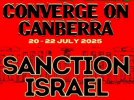 Sunday, 20 July 2025 : National Rally at Parliament House. Monday, 21 July 2025: National campaign planning day. Tuesday, 22 July 2025: Rally at Parliament House on the opening day of Parliament
Sunday, 20 July 2025 : National Rally at Parliament House. Monday, 21 July 2025: National campaign planning day. Tuesday, 22 July 2025: Rally at Parliament House on the opening day of Parliament
 Geneva - Israel has expanded its total ban on humanitarian supplies entering large areas of the Gaza Strip as part of its ongoing genocide, waged since 7 October,
Geneva - Israel has expanded its total ban on humanitarian supplies entering large areas of the Gaza Strip as part of its ongoing genocide, waged since 7 October, 
 A new network has been launched calling on the Australian Government to support a UN Convention on the Human Rights of Older Persons.
A new network has been launched calling on the Australian Government to support a UN Convention on the Human Rights of Older Persons.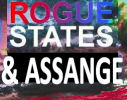 Nils Melzer’s book about the persecution of Julian Assange – Nils Melzer, The Trial of Julian Assange, A story of persecution,[1] must be heeded, due to Melzer’s extraordinary position and status as an independent international investigator and legal expert in complaints of torture and ill-treatment, [2] which has given him access to details and documents not previously available. That is probably why it is hard to get the book in Australia.
Nils Melzer’s book about the persecution of Julian Assange – Nils Melzer, The Trial of Julian Assange, A story of persecution,[1] must be heeded, due to Melzer’s extraordinary position and status as an independent international investigator and legal expert in complaints of torture and ill-treatment, [2] which has given him access to details and documents not previously available. That is probably why it is hard to get the book in Australia.

 In this video, BBC journalist Orla Guerin interviews Azerbaijan President Aliyev, assuming that Azerbaijan press and politics are heavily censored, and presses him on that. He denies the accusation, then asks her why Julian Assange has been held inhumanely for years, if the British and western press are so free. The BBC journalist simply won't acknowledge the situation for journalists and the media in her own country, kind of proving the president's point.
In this video, BBC journalist Orla Guerin interviews Azerbaijan President Aliyev, assuming that Azerbaijan press and politics are heavily censored, and presses him on that. He denies the accusation, then asks her why Julian Assange has been held inhumanely for years, if the British and western press are so free. The BBC journalist simply won't acknowledge the situation for journalists and the media in her own country, kind of proving the president's point.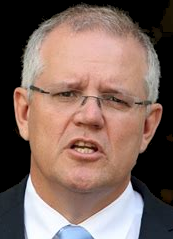
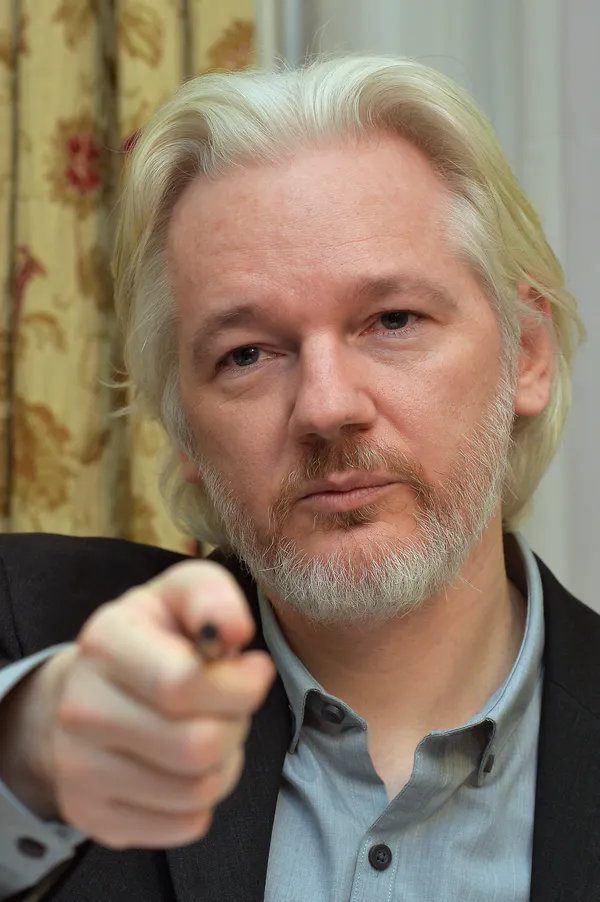
 Reform all aspects of how we treat our ageing population. More real, boots-on-the-ground funding for in home care. In home respite options. More support for carers, and recognition of the huge amount of unpaid work they are doing every single day. Complete overhaul of how income and assets are calculated, the scrapping of the "6 month hardship" rule. Streamlining the process for calculating daily fees and admission to long term placement. Specialised support and advocacy agency within the Department of Human Services, or an independent body, to assist carers to navigate the system.
Reform all aspects of how we treat our ageing population. More real, boots-on-the-ground funding for in home care. In home respite options. More support for carers, and recognition of the huge amount of unpaid work they are doing every single day. Complete overhaul of how income and assets are calculated, the scrapping of the "6 month hardship" rule. Streamlining the process for calculating daily fees and admission to long term placement. Specialised support and advocacy agency within the Department of Human Services, or an independent body, to assist carers to navigate the system. 
 In a ruling published late Tuesday, Judge John Koeltl of the US District Court for the Southern District of New York delivered a devastating blow to the US-led conspiracy against WikiLeaks founder Julian Assange. In his ruling, Judge Koeltl, a Bill Clinton nominee and former assistant special prosecutor for the Watergate Special Prosecution Force, dismissed “with prejudice” a civil lawsuit filed in April 2018 by the Democratic National Committee (DNC) alleging WikiLeaks was civilly liable for conspiring with the Russian government to steal DNC emails and data and leak them to the public. Jennifer Robinson, a leading lawyer for Assange, and other WikiLeaks attorneys welcomed the ruling as “an important win for free speech.” Article by Eric London, first published on 31 July 2019 at
In a ruling published late Tuesday, Judge John Koeltl of the US District Court for the Southern District of New York delivered a devastating blow to the US-led conspiracy against WikiLeaks founder Julian Assange. In his ruling, Judge Koeltl, a Bill Clinton nominee and former assistant special prosecutor for the Watergate Special Prosecution Force, dismissed “with prejudice” a civil lawsuit filed in April 2018 by the Democratic National Committee (DNC) alleging WikiLeaks was civilly liable for conspiring with the Russian government to steal DNC emails and data and leak them to the public. Jennifer Robinson, a leading lawyer for Assange, and other WikiLeaks attorneys welcomed the ruling as “an important win for free speech.” Article by Eric London, first published on 31 July 2019 at 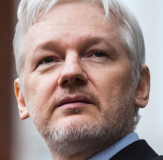
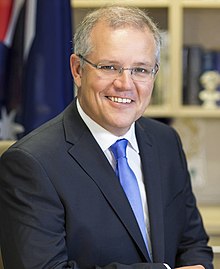
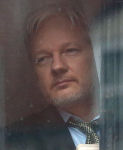
 Inside is the text of the public statement issued by the UN expert panel on Arbitrary Detention, which you will not find in most mainstream publications, which are seeking to obfuscate the UN opinion and its importance, with their own opinions. Julian Assange is a Victorian-born Australian citizen and asylum-seeker, recognised as a refugee by the UN. The Ecuadorian Embassy in London granted him refugee status, but the UK government stopped him from going to Ecuador by taking his passport and surrounding the embassy with police, day and night. What did Assange do? Assange famously published, on his Wikileaks, authentic film of US soldiers hunting down civilians with helicopters and machine guns as if they were in a video game. (Film: 'Collateral Damge' inside this article.) The US was so furious at this (and other very relevant exposures of its criminal secrets) that it mounted an international persecution of Assange. The mass media helped the criminal US by defaming Assange and they are still doing it because their owners support war and propaganda. Assange has been openly threatened with assassination by at least two US politicians. It is clear that in the biased US justice system, he does not stand a chance. To their great shame, successive Australian Governments have done nothing to help Assange. To my knowledge, only Senator Scott Ludlam in South Australia has criticised this abject failure to defend a great leader in the fight to stop wars by forcing transparency in government. (Please let me know of any other politician who has spoken up.)
Inside is the text of the public statement issued by the UN expert panel on Arbitrary Detention, which you will not find in most mainstream publications, which are seeking to obfuscate the UN opinion and its importance, with their own opinions. Julian Assange is a Victorian-born Australian citizen and asylum-seeker, recognised as a refugee by the UN. The Ecuadorian Embassy in London granted him refugee status, but the UK government stopped him from going to Ecuador by taking his passport and surrounding the embassy with police, day and night. What did Assange do? Assange famously published, on his Wikileaks, authentic film of US soldiers hunting down civilians with helicopters and machine guns as if they were in a video game. (Film: 'Collateral Damge' inside this article.) The US was so furious at this (and other very relevant exposures of its criminal secrets) that it mounted an international persecution of Assange. The mass media helped the criminal US by defaming Assange and they are still doing it because their owners support war and propaganda. Assange has been openly threatened with assassination by at least two US politicians. It is clear that in the biased US justice system, he does not stand a chance. To their great shame, successive Australian Governments have done nothing to help Assange. To my knowledge, only Senator Scott Ludlam in South Australia has criticised this abject failure to defend a great leader in the fight to stop wars by forcing transparency in government. (Please let me know of any other politician who has spoken up.)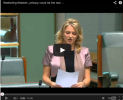
 The plain truth:
The plain truth: 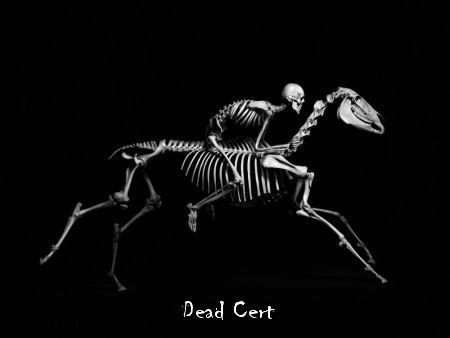 What does this mean?
What does this mean?



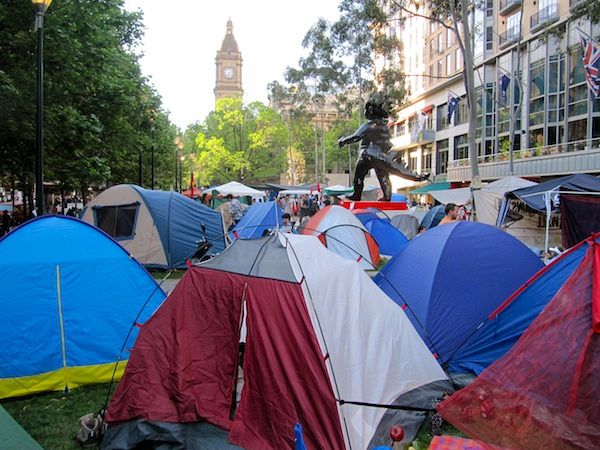
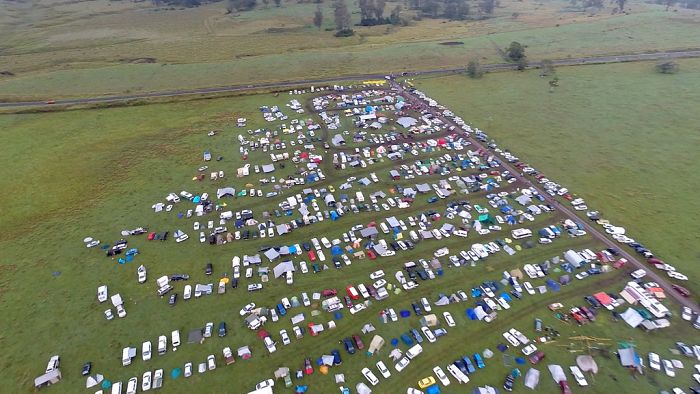

 I don’t have kids but I am disturbed about the Heart Foundation’s Active Healthy Kids very poor report card for Australian children last week. It said that Australian children are largely unfit because of a lack of exercise and that this deterioration has happened in the last couple of decades. Natasha Schranz author of the Foundation's inaugural report has graded Australian children at a disgraceful D minus. Contributing to this terrble score was a D for "active transport", meaning not nearly enough walking or bicycle riding to and from school.
I don’t have kids but I am disturbed about the Heart Foundation’s Active Healthy Kids very poor report card for Australian children last week. It said that Australian children are largely unfit because of a lack of exercise and that this deterioration has happened in the last couple of decades. Natasha Schranz author of the Foundation's inaugural report has graded Australian children at a disgraceful D minus. Contributing to this terrble score was a D for "active transport", meaning not nearly enough walking or bicycle riding to and from school.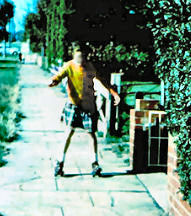
 The most powerful thing you can do to make your Member of Parliament work on your behalf is to ask them what they did to prevent harmful legislation being passed in Parliament, then publish this information. If they did nothing they stand accused. We reproduce here the speeches made against the Summary Offences and Sentencing Amendment Bill so that Victorians can see who tried to stop this. We include some pro-Bill speeches. It seems that no-one in the Liberal Party voted against it in the Legislative Assembly. The Bill is to be debated a final time, possibly tomorrow (11/3/2014), probably within the week. (Video of protests inside)
The most powerful thing you can do to make your Member of Parliament work on your behalf is to ask them what they did to prevent harmful legislation being passed in Parliament, then publish this information. If they did nothing they stand accused. We reproduce here the speeches made against the Summary Offences and Sentencing Amendment Bill so that Victorians can see who tried to stop this. We include some pro-Bill speeches. It seems that no-one in the Liberal Party voted against it in the Legislative Assembly. The Bill is to be debated a final time, possibly tomorrow (11/3/2014), probably within the week. (Video of protests inside)
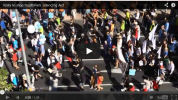 Video inside of nearly 4000 Victorians protesting re this legislation on March 6, 2014. "We believe that this harsh legislation is completely unnecessary in a society which is continually being undermined and is struggling to maintain work and environmental standards. This legislation is a further and heavy blow to democracy placing ordinary citizens in a position of increased likelihood of coming up against the force of the law for simply using one of the few weapons left, the right to congregate to demonstrate a point." - Jill Quirk, Sustainable Population Australia This article includes an annotated first and second reading of the Bill, with links to speeches against it and to Human Rights legislation in Victoria.
Video inside of nearly 4000 Victorians protesting re this legislation on March 6, 2014. "We believe that this harsh legislation is completely unnecessary in a society which is continually being undermined and is struggling to maintain work and environmental standards. This legislation is a further and heavy blow to democracy placing ordinary citizens in a position of increased likelihood of coming up against the force of the law for simply using one of the few weapons left, the right to congregate to demonstrate a point." - Jill Quirk, Sustainable Population Australia This article includes an annotated first and second reading of the Bill, with links to speeches against it and to Human Rights legislation in Victoria.
 The Australian College of Mental Health Nurses (ACMHN) joins the Royal Australian and New Zealand College of Psychiatrists’ (RANZCP) in condemning the recent announcement by Queensland Health to introduce ‘lock-up’ security measures to all adult mental health hospital inpatient facilities in Queensland, and the expansion of the use of ankle bracelets.
The Australian College of Mental Health Nurses (ACMHN) joins the Royal Australian and New Zealand College of Psychiatrists’ (RANZCP) in condemning the recent announcement by Queensland Health to introduce ‘lock-up’ security measures to all adult mental health hospital inpatient facilities in Queensland, and the expansion of the use of ankle bracelets. This week, Queensland Health ordered the State’s 16 mental health inpatient facilities to be secured, and a new ‘locked-door’ policy to be adopted effective 15 December 2013.
This week, Queensland Health ordered the State’s 16 mental health inpatient facilities to be secured, and a new ‘locked-door’ policy to be adopted effective 15 December 2013. All over the world right wing 'think tanks' will be commemorating the work of economist Ronald Coase, who died on the second of September this year (2013) at the age of 102. Unfortunately his work has been used as an excuse to marginalise civil and human rights by making it legally acceptable for the interests of big business and the wealthy to over-rule everyone else’s financial, social and environmental interests. Coase's work is largely responsible for many of the problems of democracy, overpopulation and overdevelopment that are ruining more and more peoples' lives and freedom today. Many of its lesser supporters are naive followers of fashion and don't really understand what they are losing through their innocent embrace of 'efficiency' any more, perhaps, than did the followers of Chairman Mao's 'Great Leap Forward'. (This article is based on an extract from Sheila Newman's forthcoming book, Demography, Territory, Law 2: Land-tenure and the Origins of Capitalism in Britain, Countershock Press, probably early 2014.)
All over the world right wing 'think tanks' will be commemorating the work of economist Ronald Coase, who died on the second of September this year (2013) at the age of 102. Unfortunately his work has been used as an excuse to marginalise civil and human rights by making it legally acceptable for the interests of big business and the wealthy to over-rule everyone else’s financial, social and environmental interests. Coase's work is largely responsible for many of the problems of democracy, overpopulation and overdevelopment that are ruining more and more peoples' lives and freedom today. Many of its lesser supporters are naive followers of fashion and don't really understand what they are losing through their innocent embrace of 'efficiency' any more, perhaps, than did the followers of Chairman Mao's 'Great Leap Forward'. (This article is based on an extract from Sheila Newman's forthcoming book, Demography, Territory, Law 2: Land-tenure and the Origins of Capitalism in Britain, Countershock Press, probably early 2014.)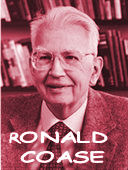 Industrial Capitalism has become a normative ethic in Britain and Anglophone societies. It has been conflated and massaged to fit a political idea that it represents a positive evolutionary development which is inevitable in human societies unless artificially or accidentally blocked. From this stems the notion of ‘developed’ and ‘developing’ societies, promoted almost without question in schools, churches and mainstream media. The presumption about the ‘developing’ societies (which were generally stable non-industrialised ones prior to the disruption of industrial development with or without colonization[1]) is that they were deprived and ‘stunted’. Industrial development in such a construction is presented as a form of normalization; a restoration to health and a normal growth curve. From this view it becomes ‘normal’ to ‘develop’ into an industrial capitalist society. Social costs are minimized in a kind of “Coasian” equation (see citation below) where all changes which increase available capital are treated as a positive benefit to the whole society. This logic justifies almost anything which will assist that transformation, notably changes to the land-tenure or property-law system. [2]
Industrial Capitalism has become a normative ethic in Britain and Anglophone societies. It has been conflated and massaged to fit a political idea that it represents a positive evolutionary development which is inevitable in human societies unless artificially or accidentally blocked. From this stems the notion of ‘developed’ and ‘developing’ societies, promoted almost without question in schools, churches and mainstream media. The presumption about the ‘developing’ societies (which were generally stable non-industrialised ones prior to the disruption of industrial development with or without colonization[1]) is that they were deprived and ‘stunted’. Industrial development in such a construction is presented as a form of normalization; a restoration to health and a normal growth curve. From this view it becomes ‘normal’ to ‘develop’ into an industrial capitalist society. Social costs are minimized in a kind of “Coasian” equation (see citation below) where all changes which increase available capital are treated as a positive benefit to the whole society. This logic justifies almost anything which will assist that transformation, notably changes to the land-tenure or property-law system. [2] The author of the article suggests that the rule of law and federalism are no longer operating in Australia. As a result of three decades of Australian governments enthusiastically embracing neo-liberal capitalist policies, power is now concentrated at the central level. Government captured by the few: the two major parties in collusion with big business nationally and internationally. With no indication from the Australian people that they seek the radical systemic reforms required to reinstate federalism and reclaim a fairer and more just society, only small steps towards reform appear realistic. The revision of the Preamble to the Constitution as a precursor to further constitutional change and the reassertion of state powers supporting of local power are suggested as first steps.
The author of the article suggests that the rule of law and federalism are no longer operating in Australia. As a result of three decades of Australian governments enthusiastically embracing neo-liberal capitalist policies, power is now concentrated at the central level. Government captured by the few: the two major parties in collusion with big business nationally and internationally. With no indication from the Australian people that they seek the radical systemic reforms required to reinstate federalism and reclaim a fairer and more just society, only small steps towards reform appear realistic. The revision of the Preamble to the Constitution as a precursor to further constitutional change and the reassertion of state powers supporting of local power are suggested as first steps. 



Recent comments